The Winds of Climate Change: How Extreme Weather Affects a Local Farm
By Memo Hutson
Reporting Texas
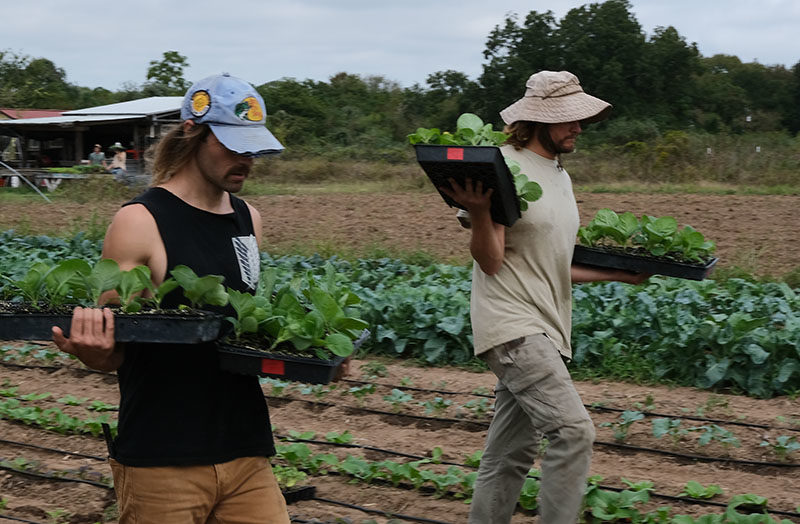
Farm manager Matt Simon, right, and a volunteer get ready to plant seedlings at Green Gate Farms in Bastrop, Texas, on Oct. 19, 2019. Memo Hutson/Reporting Texas
BASTROP — On a hot fall afternoon, two farmers and six volunteers tend the land at Green Gate Farms.
The two farmers are Skip Connett and Erin Flynn, the husband and wife duo who started the USDA-certified organic farm in 2006. They are working to create sustainable and community-oriented farming practices in Central Texas — and they are on the firing line when it comes to climate change.
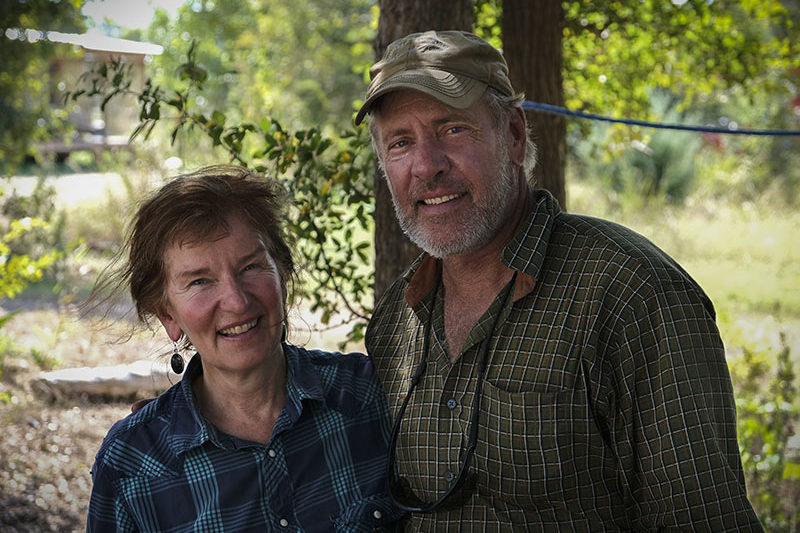
Owners and operators of Green Gate Farms, Erin Flynn, left, and Skip Connett discuss the effects of climate change on Oct 19, 2019. The couple is increasingly worried about climate change’s compounding and detrimental effects. Memo Hutson/Reporting Texas
Connett, 63, and Flynn, 57, offer a workshare program in which volunteers plant, tend and harvest crops for four hours during the week. By teaching volunteers what it means to do a day’s work on the farm, Connett and Flynn say they are creating a community that is better educated about local food production. They send their newsletter to about 4,500 people and have two farms that are part of the Green Gate umbrella — the River Farm in Bastrop and an urban farm in Austin.
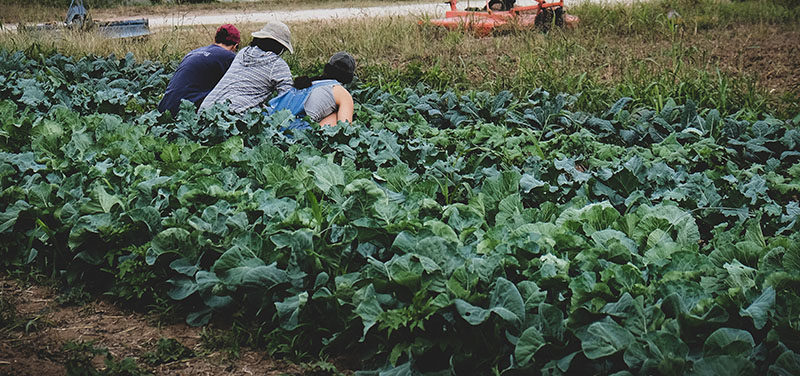
Three volunteers work the soil as part of a work share program at Green Gate Farms. As a result, they gain farming experience and earn fresh vegetables. Memo Hutson/Reporting Texas
Connett and Flynn have grown exasperated with climate change in Central Texas. Farmers have always dealt with uncooperative weather, but the hotter summers and swings in temperature have become more severe and increasingly erratic. Drier conditions during the planting season can create difficult conditions throughout the year and delay planting times. As a result, Flynn and Connett have to be more vigilant than ever. “We’ve experienced climate change in every way,” Flynn said.
Flynn’s family has deep, multi-generational roots as ranchers in East Texas. Connett has a background in Pennsylvania agriculture and was working in public health along with Flynn when the urge to start a farm grew ever stronger. Their community farm has been in operation since 2006.
This September was the warmest in Austin’s history according to the National Weather Service. In October and November, multiple severe weather events moved through the region, bringing 30-degree plus dips in temperature, wind advisories and multiple freeze warnings. Despite these bursts of colder temperatures, Texas continues to get warmer on average.
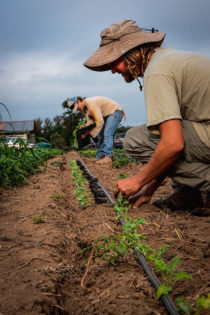
Prolonged dry summers make it hard for farmers to get their crops in the ground on schedule. Volunteer Philip Jankoski, left, and Green Gate farm manager Matt Simon plant in October. Memo Hutson/Reporting Texas
John Nielsen-Gammon, the state climatologist, said the increasing severity and frequency of drought is one of the greatest threats facing farmers.
“Temperatures have increased, which means things will dry out faster,” Nielsen-Gammon said. “From April to July, when rainfall is particularly critical for agriculture, there has not been an increase in rainfall. The net combination of the two has presumably made for drier conditions during the crop-growing season.”
As a result, Connett and Flynn are adjusting when they plant. Due to the prolonged dry summer, the two have not been able to plow segments of their land to prep for planting.
“It’s been so dry that you can’t get a tractor to break open the soil,” Flynn said.
Delaying planting can make crops susceptible to the other extremes of temperature, such as cold snaps. Connett and Flynn have to cover vulnerable crops and quickly harvest the spring and summer vegetables before they are ruined.
Farms depend on reliable climate conditions to bring crops to yield. Changes in the severity and frequency of droughts, floods and cold snaps make it difficult to plan ahead.
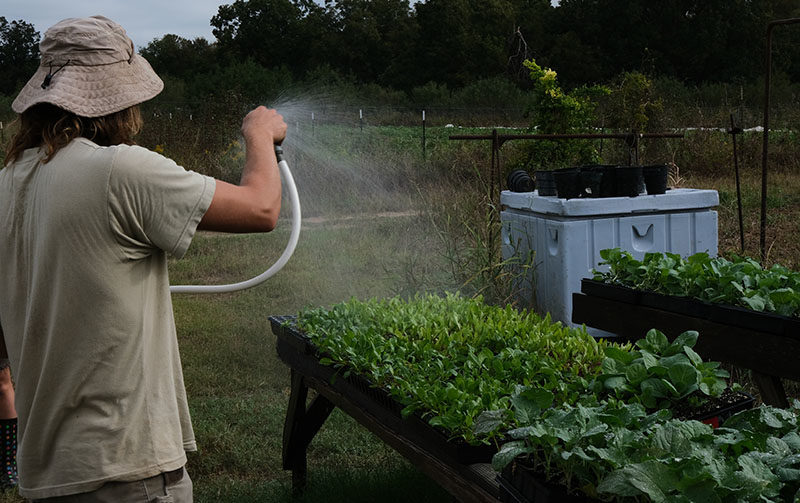
Farm manager Matt Simon waters plants at Green Gate Farms in October. Erratic temperature shifts have forced farmers to harvest summer crops more quickly. Memo Hutson/Reporting Texas
This year is a perfect example of erratic temperatures, Connett said. There was a record wet spring nationwide, and in Central Texas the wet spring was followed by a record hot and dry summer.
“From extreme wetness to extreme drought in six months,” Connett said. “I mean how do you plan for that? It’s head spinning.”
Nielson-Gammon suggested that climate-resilient crops are the way forward.
“I expect there to be a bigger move toward heat-tolerant crops because those will be inherently less risky to grow,” Nielsen-Gammon said. “They will not be dependent on getting crops planted in a narrow range of dates.”
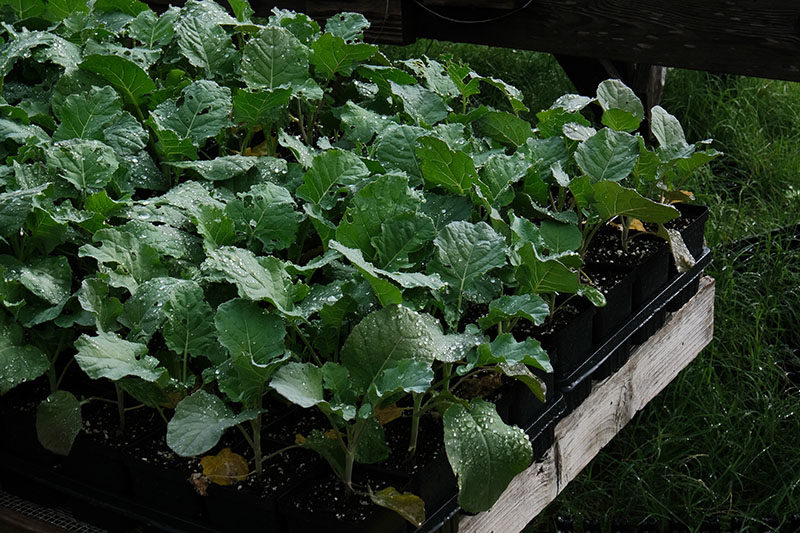
Freshly prepped and washed plants wait in pallets at a work station on Green Gate Farms in October. In the future, farmers may have to switch to more climate-resilient crops, said Texas climatologist John Nielsen-Gammon. Memo Hutson/Reporting Texas
Aside from forcing them to change crop types and planting methods, climate change inflicts less obvious burdens on farmers. Allergies can be a big problem, Flynn said.
Warmer temperatures can extend the pollen season and increase the amount and severity of airborne allergens. Flynn said her allergies are becoming more severe and because of that she is less effective on the farm.
“There all these little factors that add up — all these ripple effects,” Flynn said.
Changing climate means an increase in crop-destroying insects. Pests such as the pickle worm, which used to migrate north during warm weather, are overstaying their welcome.
“They are here so much longer, and they are devouring stuff,” Connett said.
The changing climate also means more fires, flooding and destructive winds.
In 2011, fires burned over 30,000 acres around Bastrop and destroyed over 1,500 homes. The drying associated with increase of heat in summertime causes an increase in fire risk.
In response to the flooding this spring, Connett and Flynn installed a number of fail-safes to catch runoff around the farm. However, due to the drought over the summer, they haven’t been able to test their new flood prevention measures.
Straight-line winds that follow extreme thunderstorms are increasing because of climate change. These winds reach speeds greater than 58 mph and cause serious property damage.
“We have a lot of delicate structures that allow us to extend the growing season, and the winds that come are not like we have had before,” Flynn said, pointing to various areas on the farm where they had to do extensive rebuilding. “They really do come like a bullet. It destroys things.” Flynn gestured at nearby wood debris where winds knocked down a 200-year-old pecan tree they were using as a centerpiece for wedding events.
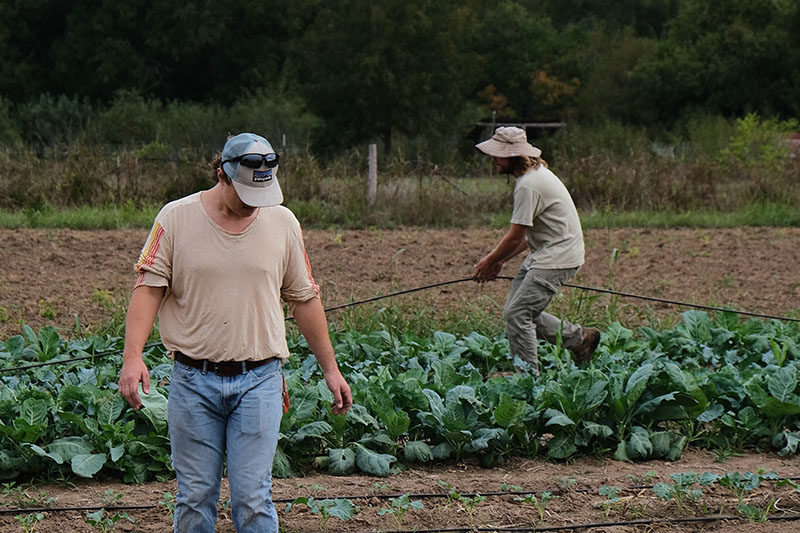
Philip Jankoski, left, and farm manager Matt Simon set up drip line irrigation along rows of crops. The trees in the background can help serve as wind breaks when straight-line winds, which have become more common, threaten structures on the farm. Memo Hutson/Reporting Texas
The only protection against the straight-line winds are mature trees that can act as wind break, Flynn said.
The effects of climate change compound. As Flynn and Connett describe it, the chain reaction can look something like this: A severe storm rolls through Central Texas in late spring and causes extensive flood damage. Straight-line winds that accompany the storm knock down trees on the farm. With fewer trees acting as a wind break, even more trees are knocked over by winds, and as a result there is less shade to cover the soil. With less shade during increasingly hotter summers, the soil gets drier and more difficult to prep. With drier soil, there is less vegetation and an increase in fire risk, and so on.
“It’s just this vicious cycle,” Connett said. And for Green Gate Farms, lack of climate action can literally mean disaster.
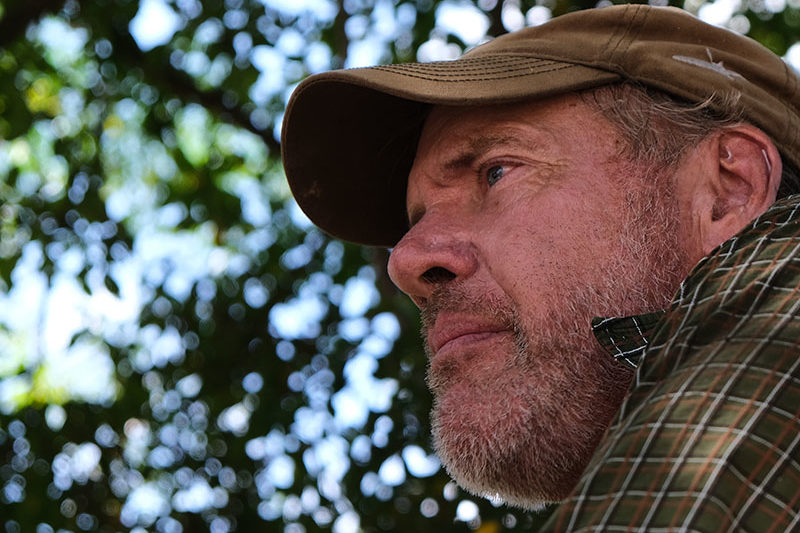
Skip Connett considers himself on the front lines of climate change. He said he wishes the public would pay more attention to the challenges farmers are facing. Memo Hutson/Reporting Texas
“Bastrop has had more federal disaster aid declarations in the last 10 years than probably the last 50.” Connett said. “Drought. Flood. Wind damage. You can’t even keep up with it.”
Bastrop had at minimum one disaster declaration per year from 2015-2018 according to the Texas Legislative Library.
Connett and Flynn think of themselves as canaries in the coal mine. The public should view farmers as environmental consultants who know what they are talking about Flynn said.
“Farmers are on the front line of climate change,” she said. “And they have an expertise that no one else has.”